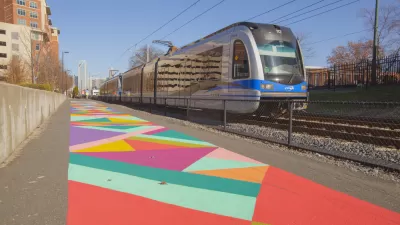Former Charlotte Mayor Patrick Cannon resigned after taking bribes in exchange for zoning and parking privileges. Will the fallout affect the city's streetcar plans or its efforts to streamline permitting and code enforcement?
Following former Mayor Patrick Cannon's recent arrest and subsequent resignation for accepting bribes from an undercover federal agent in exchange for zoning and parking privileges, local stakeholders are concerned about two of the city’s most significant efforts regarding land use and infrastructure. First is a planned expansion of the $126 million Gold Line streetcar—developments along the proposed route of the streetcar were the subject of some of the promises made by Cannon during the federal investigation. The second is an ongoing effort to streamline the city’s permitting and code enforcement process.
Andrew Dunn reports on the implications of the scandal to the streetcar project. In fact, the corruption charges center on promises made regarding possible development along the line: “Deep in the 42-page affidavit outlining the federal government’s investigation of Patrick Cannon, the former mayor touts his ability to connect a supposed business partner with a “prominent Charlotte developer” with significant land holdings along the proposed streetcar line,” writes Dunn.
Although the affidavit doesn’t specifically identify the developer Cannon mentioned, Dunn spoke with a few of the developers with properties along the line, who are worried that the scandal might risk the transit project and the many potential development investments that would have followed.
In a separate article, Eric Frazier reports that in the wake of the scandal, City Manager Ron Carlee and Mecklenburg County Manager Dena Diorio have reassured the Charlotte Chamber of Commerce that they are going ahead with plans to “streamline local permitting and code enforcement.”
“After decades of complaints from developers, they intend to hire consultants to see whether the permitting currently split between the city and county can be made more efficient,” writes Frazier.
The city had announced its intentions to study reforming the development approval process before the scandal broke.
FULL STORY: Gold Line landowners hope Patrick Cannon case doesn’t derail Charlotte streetcar

Alabama: Trump Terminates Settlements for Black Communities Harmed By Raw Sewage
Trump deemed the landmark civil rights agreement “illegal DEI and environmental justice policy.”

Planetizen Federal Action Tracker
A weekly monitor of how Trump’s orders and actions are impacting planners and planning in America.

The 120 Year Old Tiny Home Villages That Sheltered San Francisco’s Earthquake Refugees
More than a century ago, San Francisco mobilized to house thousands of residents displaced by the 1906 earthquake. Could their strategy offer a model for the present?

In Both Crashes and Crime, Public Transportation is Far Safer than Driving
Contrary to popular assumptions, public transportation has far lower crash and crime rates than automobile travel. For safer communities, improve and encourage transit travel.

Report: Zoning Reforms Should Complement Nashville’s Ambitious Transit Plan
Without reform, restrictive zoning codes will limit the impact of the city’s planned transit expansion and could exclude some of the residents who depend on transit the most.

Judge Orders Release of Frozen IRA, IIJA Funding
The decision is a victory for environmental groups who charged that freezing funds for critical infrastructure and disaster response programs caused “real and irreparable harm” to communities.
Urban Design for Planners 1: Software Tools
This six-course series explores essential urban design concepts using open source software and equips planners with the tools they need to participate fully in the urban design process.
Planning for Universal Design
Learn the tools for implementing Universal Design in planning regulations.
Clanton & Associates, Inc.
Jessamine County Fiscal Court
Institute for Housing and Urban Development Studies (IHS)
City of Grandview
Harvard GSD Executive Education
Toledo-Lucas County Plan Commissions
Salt Lake City
NYU Wagner Graduate School of Public Service



























